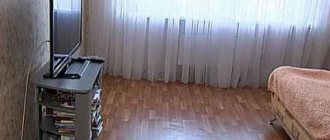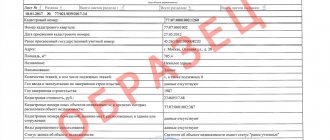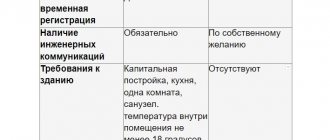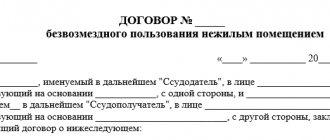Ordinary citizens have many questions regarding recognition of the loss of the right to use residential premises or the preservation of the right to use when the owner changes.
Ambiguous judicial practice misleads both lawyers and ordinary citizens in choosing the method of protecting their rights. It is for this reason that the Supreme Court of the Russian Federation, in its Plenum (No. 14 of July 2, 2009), outlined the main recommendations for these categories of litigation.
The need to recognize the right to use residential premises as lost and, in connection with this, deregister, arises for one of the following reasons:
- the citizen voluntarily left the residential premises due to a change in family circumstances;
- the citizen was forced to leave the residential premises;
- the location of the citizen registered in the residential area is not known;
- the person has ceased to be a family member of the owner of the residential premises.
In this article we will consider the last case when the owner of a residential premises changed. Commentary from a housing lawyer with experience in matters of recognition of the loss of the right to use residential premises.
The Civil Code of the Russian Federation in Article 292 establishes the rights of family members of the owners of residential premises: family members of the owner living in residential premises belonging to him have the right to use this premises under the conditions provided for by housing legislation.
At the same time, part 2 of Art. 292 of the Civil Code of the Russian Federation states that the transfer of ownership of a residential building or apartment to another person is the basis for termination of the right to use residential premises by family members of the previous owner, unless otherwise provided by law.
The above-mentioned Plenum No. 14 of July 2, 2009 clarified these points by indicating that former family members of the owner lose the right to use the residential premises and must vacate it (Part 1 of Article 35 of the Housing Code of the Russian Federation). Otherwise, the owner of the residential premises has the right to demand their eviction in court without providing another residential premises. (Clause 13 of the Plenum).
Preservation of the right of use upon change of owner.
The interpretation in the law: “unless otherwise established by law” makes reference to Art. 31 of the Housing Code of the Russian Federation, which states that in the event of termination of family relations with the owner of a residential premises, the right to use this residential premises for a former family member of the owner of this residential premises is not retained, unless otherwise established by an agreement between the owner and the former member of his family. If a former family member of the owner of a residential premises has no grounds for acquiring or exercising the right to use another residential premises, and also if the property status of a former family member of the owner of a residential premises and other noteworthy circumstances do not allow him to provide himself with another residential premises, the right to use the residential premises owned by to the specified owner, may be retained by a former member of his family for a certain period of time on the basis of a court decision (Part 4 of Article 31 of the Housing Code of the Russian Federation).
This means that a person registered in a residential area can be deregistered and deregistered at the request of the new owner, unless there is a special agreement between the owner and the former family member.
In addition, at the request of a former family member, the court may retain the right to use residential premises for a certain period in the following cases:
a) a former member of the owner’s family does not own any other residential premises, there is no right to use other residential premises under a lease agreement; the former family member is not a party to an agreement on shared participation in the construction of a residential building, apartment or other civil legal agreement for the purchase of housing, etc.; b) if a former member of the owner’s family does not have the opportunity to provide himself with other residential premises (buy an apartment, enter into a rental agreement for residential premises, etc.) due to his property status (no income, insufficient funds) and other noteworthy circumstances (health status, incapacity for work). age or health status, the presence of disabled dependents, loss of work, study, etc.).
The right of a former family member to eliminate violations of his rights to residential premises from the owner is enshrined in Part 3 of Art. 292 of the Civil Code of the Russian Federation. This means that a former family member can bring a claim against the new homeowner.
home
Published: 21 Sep 2021
On amendments to the resolution of the Abakan City Administration dated September 15, 2021 No. 1652 “On the beginning of the heating period 2021 - 2022 in the city of Abakan”
Guided by clause 1, part 1, art. 6 of the Federal Law of July 27, 2010 No. 190-FZ “On Heat Supply”, paragraph 5 of the Rules for the provision of utility services to owners and users...
Read completely
Published: 11 Aug 2021
MUP "Vodokanal" reports that from 23:00 on August 12, 2021 to 23:00 on August 13, 2021, the water distribution facilities on the left bank of Abakan will be disconnected
Read completely
Published: 10 Aug 2021
The Abakanskaya CHPP branch of Yenisei TGC (TSK-13) JSC informs you that on 08/12/2021 from 04-00 a.m. until 08/17/2021 06-00 a.m., in accordance with the agreed schedule of repair work, a complete shutdown of the CHP plant is being carried out . During this period, the supply of hot water to consumers will be stopped.
Read completely
Published: 05 Jul 2021
Telephone message No. 121 dated 07/02/2021
The Abakanskaya CHPP branch of Yenisei TGC JSC (TSK-13) informs you that on 07/05/2021 from 09-00 to 16-30 there will be a shutdown of hot water supply due to the installation of throttle washers. You need to close the inlet valves at the metering units. Buildings subject to shutdown: St. Dr. 41 nations...
Read completely
Published: 11 Jun 2021
The Abakanskaya CHPP branch of Yenisei TGC JSC (TSK-13) reports that on 06/15/2021 from 04:00 until 06/16/2021 16:00 the return pipeline will be completely disconnected, hot water will be supplied through the supply pipeline in dead-end mode.
Read completely
Published: May 15, 2021
The Abakanskaya CHPP branch of Yenisei TGC JSC (TSK-13) reports that on 05/17/2021 from 00:00 until 05/22/2021 24:00, hydraulic tests of pipelines will be carried out for strength and density. During this period, the supply of hot water to consumers will be stopped.
Read completely
Published: Apr 17, 2021
Dear users of the Operation service.
We would like to inform you that meter readings are not currently displayed in your personal account and the “Operation” mobile application. This is due to the update of the readings recording system. We expect to fix this problem by March 31, 2021.
This limitation does not affect...
Read completely
Published: 20 Apr 2020
Dear residents!
In accordance with RESOLUTION dated April 20, 2021 No. 618, the heating season ends on April 20, 2020.
Read completely
Published: Apr 15, 2020
Dear owners!
Due to the difficult economic situation, we ask you to pay utility bills on time. There are no deferred payments for owners. Resource supply organizations demand that debts on all apartment buildings be repaid on time.
The need for timely payment is regulated in the Housing...
Read completely
Published: 02 Oct 2019
Dear owners!
From October 1 to October 10, 2021, the passport office is closed!
Phone number for inquiries: 306-770.
Read completely
Who does the law classify as former family members?
Within the meaning of parts 1 and 4 of Article 31 of the Housing Code of the Russian Federation, former family members of the owner of a residential premises include persons with whom the owner’s family relations have been terminated. The termination of family relations between spouses should be understood as the dissolution of a marriage in the civil registry office, in court, or the recognition of a marriage as invalid. Refusal of other persons to maintain a common household with the owner of the residential premises, lack of a common budget or common household items with the owner, failure to provide mutual support to each other, etc., as well as departure to another place of residence may indicate the termination of family relations with the owner living space.
The issue of recognizing a person as a former family member of the owner of a residential premises in the event of a dispute is decided by the court, taking into account the specific circumstances of each case.
Who is responsible for landscaping the local area?
By virtue of Part 2 of Art. 162 of the Housing Code of the Russian Federation, the management organization under the management agreement undertakes to:
- perform work and provide services for managing apartment buildings,
- create favorable and safe living conditions for citizens,
- provide CG to consumers in MKD,
- carry out work and provide services for the maintenance and repair of equipment in the apartment building.
According to clause 11 of the Rules for the maintenance of common property, approved by RF RF No. 491, the management organization, including:
- cleans and carries out sanitary and hygienic cleaning of common areas, a land plot that is part of the public area,
- collects and removes MSW and MSW,
- takes care of landscaping and landscaping elements, objects intended for maintenance, operation and improvement of apartment buildings.
But all this does not apply to land plots that are not part of the common property in the apartment building . The listed actions in this case are carried out by the owners of land plots.
Read more about the national project “Urban environment and housing and communal services” here
Why is it necessary to distinguish personal from common property?
It is not without reason that the legislator clearly defines the provisions on the composition of the joint property of residents. Why is this done? You can dispose of your own housing at your own discretion, while shared housing only with the consent of all co-owners.
The distinction helps determine how much to bear the costs of maintaining a particular property. Owners pay and are responsible for their own.
They chip in together for the maintenance of the common. Therefore, delimitation helps to divide the areas of responsibility of each tenant in relation to various property objects.
Is the decision of the general meeting binding?
Based on the results of consideration of the issues raised at the meeting of MKD owners, they make a decision. To do this, everyone present must vote.
It usually requires the votes of a majority of residents to pass. The progress of the meeting itself should be recorded in the minutes, and the agreements reached should be reflected in the decision.
This document is official and binding. This is directly stated in Art. 46 Housing Code of the Russian Federation. If decisions are made correctly without any violations, then they need to be implemented even by those who were not present at the meeting itself.
However, such persons have the opportunity to appeal this decision if they consider it a violation of their rights. In cases where there is only one owner in the house, he makes all decisions himself.
Regardless of the reasons for using an apartment in an apartment building, all residents must respect the interests of their neighbors and the established standards of living in apartment buildings.
Residents-owners, in addition to the rights to their housing, also acquire certain responsibilities. Failure to comply may result in unfavorable consequences for apartment owners, including eviction.
You can learn about some of the rights and responsibilities of apartment building owners by watching the video:
See also Phone numbers for consultation 03 Dec 2021 kasjanenko 1095
Share this post
Discussion: there is 1 comment
- Irina says:
08/08/2020 at 09:24How often should homeowners' meetings be held? If there are municipal apartments in an apartment building, then those living in them do not have the right to participate in meetings?
Answer
What is included in the common property of an apartment building?
The concept of common property of owners of apartment buildings
For many, the common property of a multi-storey building is a very abstract concept.
Not everyone knows what exactly this applies to. In fact, the places, equipment, and technical equipment used by all residents of the house and necessary for its operation as a whole are recognized as common.
In other words, everything outside the apartments is common.
Common ones include:
- staircases, corridors;
- elevators;
- attics and basements;
- other non-residential premises;
- house electrical networks;
- engineering networks and equipment;
- land under the house.
Landscaping of the yard area
We propose to study what principles of landscaping the courtyard area are outlined by the Ministry of Construction of the Russian Federation. First of all, the department notes that all Russian yards are united by a number of problems:
- there are no clear boundaries between the city-wide territory and the yard,
- there are not enough parking spaces,
- lighting is not adjusted,
- infrastructure for different user groups is not developed,
- There are no areas for walking pets,
- climatic discomfort.
There are six types of courtyards: with historical, low-rise, mid-rise, mid-rise microdistrict, high-rise microdistrict and modern high-rise buildings.
If you are concerned about the improvement of the courtyard area , then the Ministry of Construction of the Russian Federation recommends starting with the distinction between the private and public space of the courtyard. This is necessary to ensure the comfort and safety of various groups of the population.
To do this, you need to mark the entrance to the yard: install navigation elements and lights. To form the perimeter of the yard, and not necessarily with the help of a fence, it is best to plant a green fence. Afterwards, organize the main and secondary passages, arrange the entrances to the entrances: build ramps, bicycle parking, etc.
The next step to create a comfortable courtyard area is the arrangement of parking lots . The Ministry of Construction of the Russian Federation recommends organizing flat parking for residents of the house and linear parking for guests. It is recommended to discuss the number of parking spaces with the owners. It is imperative to provide parking spaces for the disabled .
To improve the lighting of courtyards, you need to install additional lights:
- at the entrance to the house (5–7 meters),
- on children's and sports grounds (7–9 meters),
- near the driveways (7 meters).
The first group of users that should be taken care of are children. For their diversified development, it is necessary to organize playgrounds that meet the needs of different age groups: 0–3 years, 3–7 years, 7–12 and 12–15 years.
Children's playgrounds should be equipped with:
- ballot boxes,
- information stand,
- hedge,
- soft coverings,
- seating,
- canopy,
- Board games,
- themed game complexes,
- elements for active games, etc.
Areas for adults should be focused on both sports and relaxation - include places for outdoor exercise equipment, table tennis, and board games.
The arrangement of areas for walking pets should improve the sanitary condition of the area and safety for residents. Such areas can be unfenced or fenced.
In an unfenced area, it is necessary to install an information stand, trash cans, seating and soft covering. For fenced ones, install an additional gate.
Find out why it is important to accurately determine the composition of common property in an apartment building







